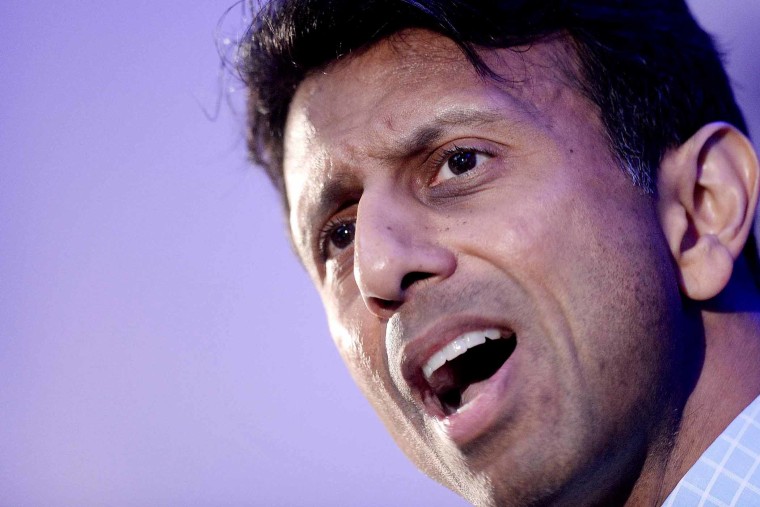A day after Jeb Bush’s unofficial 2016 debut in Detroit, Louisiana governor Bobby Jindal delivered a preview of his own.
The stated topic of Jindal’s address was near and dear to Bush’s heart: Common Core. Bush championed the federal education standard, but it’s since become a major issue on the right and one of the former Florida governor's biggest vulnerabilities in the Republican primaries. The venue was a luncheon sponsored by the American Principles Project, a conservative group that’s led the charge against the standards.
The Bush connection was not subtle. Emmett McGroarty, director of APP Education, warned in his opening remarks that if the GOP nominated a pro-Common Core candidate, they’d be “unelectable” against Hillary Clinton who "has no Common Core baggage."
“[In] this Common Core fight,” Jindal said in his speech. “We are going to sometimes have people who we agree with on other issues fight us on this.”
He did not single out Bush, telling reporters afterwards that he’s “been complimentary in the past -- apart from Common Core -- about some of the things he's done in education.” But the event was a reminder that the issue will loom large in the 2016 election for the Florida governor.
RELATED: Jeb Bush: Opportunity gap is 'defining issue of our time'
Jindal wasn’t always a Common Core opponent. Louisiana, with his backing, was one of the 45 states to voluntarily adopt Common Core standards and as recently as 2012 he said it “will raise expectations for every child.” Last year, however, he withdrew the state from the program over the objections of his own top education official. He has since gone on an all-out offensive against the standards, which he has likened to “centralized planning” in Soviet-era Russia, and is suing the federal government to block them.
Objections to the standards are varied and not limited to conservative groups. Some critics object to the executive branch playing a prominent role in state and local education or fear uniform standards will have negative effects. The standards were negotiated between the states themselves, do not dictate class curriculums, and are not required by the federal government, but Jindal and others complain that the Department of Education included Common Core adoption as a condition for competing for its Race To The Top grants.
Then there’s the darker side of Common Core opposition. The standards have become fertile ground for conspiracy theories about shadowy government plots to brainwash children, especially in the hands of conservative host Glenn Beck. Any candidate running for president in 2016 can expect to hear plenty of these concerns in town halls for the next year.
Jindal’s speech struck a balance between the two flavors of opposition. The Common Core does not regulate history curriculums, for example, but he asked – just generally, mind you – “What happens when American history is not the American history you and I know about, but rather it becomes a history of grievances?
RELATED: Bobby Jindal talks ‘no go zones,' demands immigrants assimilate
But education was only one part of his address on Thursday.
“I’m going to talk about, for example, some remarks I made about London about the challenge posed by radical Islamic terrorism, I’m going to talk about Obamacare, and I’m going to tie it together with why I think it’s so important that we keep Common Core out of our classrooms,” he said in his opening remarks.
If anything, the thread tying between these topics was that Jindal’s address resembled a stump speech, with an extensive retelling of his son-of-immigrants biography and boasts about cutting taxes as governor as well as attacks on Republicans who got in the way of the conservative grassroots.
Jindal, a former Rhodes scholar who held high-level Bush administration and state posts before his 30th birthday, has been laying the groundwork for a presidential election as a conservative wonk who refuses to be outflanked on the right.
After the Charlie Hebdo attacks in Paris last month, Jindal railed against “no-go” zones in Europe, places where non-Muslim authorities feared to tread, and continued to do so even as Fox News retracted its own reports on the phenomenon, having concluded that they were a myth.
This month, he’s taken right-leaning policy thinkers to task for proposing health care replacements that still raise taxes to expand coverage. On Thursday, he extended his critique to leaders in Washington even as they worked on passing another Obamacare repeal bill, warning them not to become “Democrat-lite" by retaining any of its components.
“If the whole point of this election was simply to give John Boehner and Mitch McConnell nicer offices, let’s give them back,” Jindal said. “What is the point of having a Republican Party if it’s only going to become a second liberal party?”
Jindal may offer a concentrated pure form of conservatism to GOP voters, but there will be plenty of other candidates promising the same and his challenge will be to stand out in the GOP field. He's been on the national stage for several years, but has yet to show meaningful strength in polls of Republican voters. With the primaries wide open, now is his best chance yet to finally make an impression.
